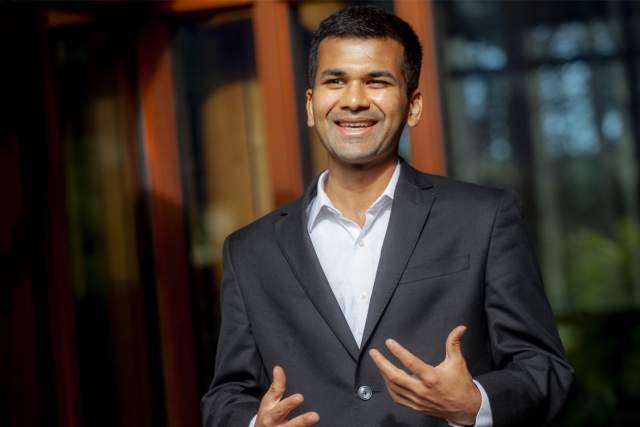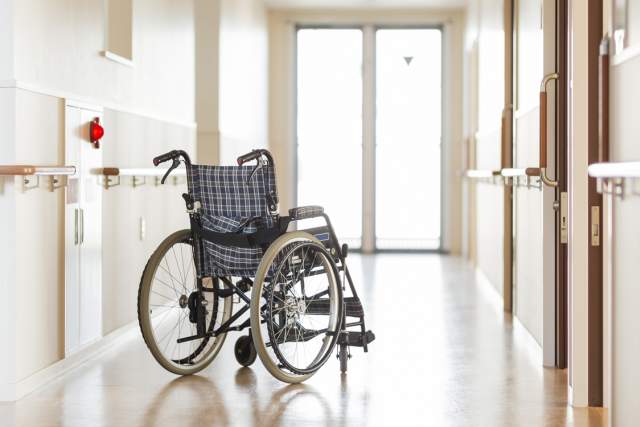It might be human nature to bemoan the ills of the present and look fondly back to some vague time when things were better.
It might be human nature to bemoan the ills of the present and look fondly back to some vague time when things were better. Usually, that’s just our minds playing tricks on us. But it’s not unfair to say we are living through some immensely challenging circumstances today and, probably more than normal, individuals, businesses, and governments don’t know what the future will hold. This was true even before the pandemic, with climate change bearing down and a trade war between the U.S. and China making countless items more expensive and harder to find. And then came COVID, with its tragic human toll and massive disruption of lives, companies, and societies.
Businesses have always needed to be shrewd about predicting and responding to shifts in the status quo—in the form of technology, culture, the environment, and global events—but it seems that those shifts are happening more often and more quickly than ever. Every research group in the Tuck faculty is devoted to this imperative of timely and savvy decision-making, but perhaps none more so than the professors in the Operations and Management Science group. These celebrated thought leaders use prescriptive models and data-driven analytics to understand and improve decision-making in supply chain, energy, and environmental applications, and specialize in decision-making under uncertainty, supply chain design and process innovation, health care operations, and revenue management. And they teach these principles and skills in a wide range of core and elective courses that are constantly updated and refined to help students deal with the business world as it is now and how it will be soon.
Read on to learn how faculty in the Operations and Management Science group, and Tuck’s international trade economists, are using their research and teaching to better the world through business.

Lauren Lu
Associate Professor of Business Administration, Daniel R. Revers T’89 Faculty Fellow
Focus // Analytics and Digital Operations
The Challenge
Tracking consumers in the physical world is much harder than doing it in the digital one, but new technologies and methods are shrinking that gap. Tuck associate professor Lauren Lu has been studying these developments and learning how retailers can use data from various sources to understand consumer behavior and make better operational decisions.
The Challenge
“We show that if you are smart about accommodating drivers’ preferences, you can have decent performance guarantees on how much profit you can reap from the system,” Raghav Singal, an assistant professor of business administration says. “It’s kind of a win-win: you can increase drivers’ welfare without hurting platform profits.”
The Challenge
A key aspect of digital operations is the almost real-time and fine-grained marriage of the physical and digital worlds using technologies like the Internet of Things (IoT), AI, analytics, robotics, 3D printing and blockchain. There are myriad interesting intersections in this area, but for Brian Tomlin, the Wiliam and Josephine Buchanan Professor of Management, one of the most important is the use of IoT and AI technology to keep industrial assets running and generating revenue.
Read more
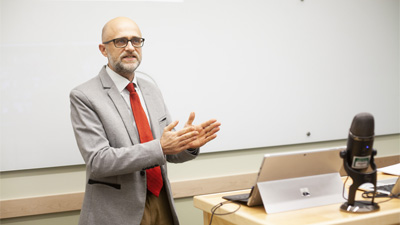
Laurens Debo
Professor of Business Administration
Focus // Food Waste
The Challenge
In July of 2020, Vermont became the first state in the nation to make it illegal to put food waste into the conventional trash stream. The best thing to do with food waste is to turn it into compost, so it can be used as soil to grow more food, but the logistics of implementing a composting system at a large scale are quite daunting. That’s the challenge Tuck professor Laurens Debo is studying, along with Thayer colleagues Vikrant Vaze, the Stata Family Career Development Associate Professor of Engineering, and Lilly Yang, a Ph.D. student.
Read more
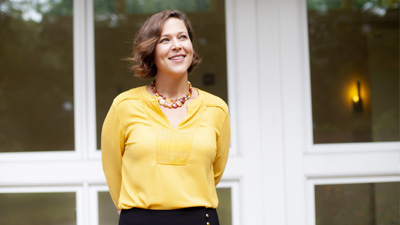
Emily Blanchard
Associate Professor of Business Administration; Current Chief Economist, U.S. Department of State
Focus // Global Trade
The Challenge
“It’s just an incredibly uncertain time for firms to be figuring out how to get their products to market,” says Emily Blanchard, an associate professor of business administration. As international trade economists, Blanchard and her colleagues in the economics research group at Tuck tend to think about the current supply chain woes as a policy issue at the level of firms and nations.
Read more
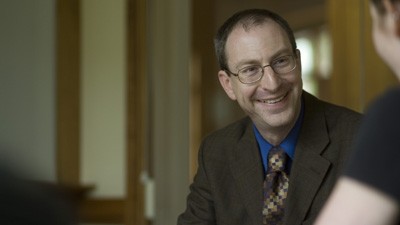
Rob Shumsky
Professor of Operations Management
Focus // Health Care Operations
The Challenge
Many important decisions rest on incomplete information, and for Rob Shumsky, professor of operations management, that’s all the more reason to use science and math to guide the way. “Uncertainty might make someone question the point of modeling—if you don’t know anything, you don’t know anything,” he says. “But the great thing about modeling is that you can understand if the uncertainty makes a difference in what the best decision is. You not only find the optimal solution, but you can also see how robust that solution is, given the unknowns.”
The Challenge
Heart disease is the leading cause of death in the United States, and one of the most common symptoms of heart disease is heart attack. Heart attacks are highly treatable, but patients must be treated quickly to maximize their chance of survival. “This is where I see an operations management opportunity,” says Lauren Lu, an associate professor of business administration and the Daniel R. Revers T’89 Faculty Fellow. As an operations management professor, Lu likes to optimize processes and increase efficiencies, and one area she has targeted for research is in the transfer of heart attack patients across hospitals.
Read more
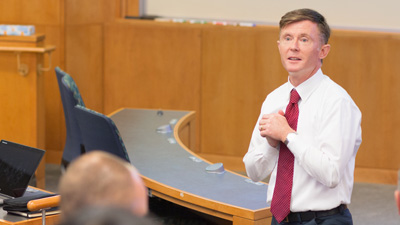
Brian Tomlin
Senior Associate Dean for Faculty and Research; William and Josephine Buchanan Professor of Management
Focus // Supply Chain
The Challenge
Supply chain disruptions are nothing new, but they have become one of the most important global concerns over the past few years because of the dual crises of the COVID pandemic and various politically driven trade discontinuities and disputes. Brian Tomlin, the William and Josephine Buchanan Professor of Management, and the senior associate dean for faculty and research, has been studying supply chain resiliency since the early 2000s.
“In the past, as a consumer, supply chains have been like referees in sports games,” Tomlin says, “you only see them when things go wrong. Well, many things are going wrong at the same time now, so people, companies, and governments are paying attention. The one benefit for companies at the moment is that all their competitors are suffering, and customers are therefore more understanding, or to take a more cynical view, their customers have fewer switching options given overall supply constraints.”
Read more
This article originally appeared in print in the winter 2022 issue of Tuck Today magazine.






